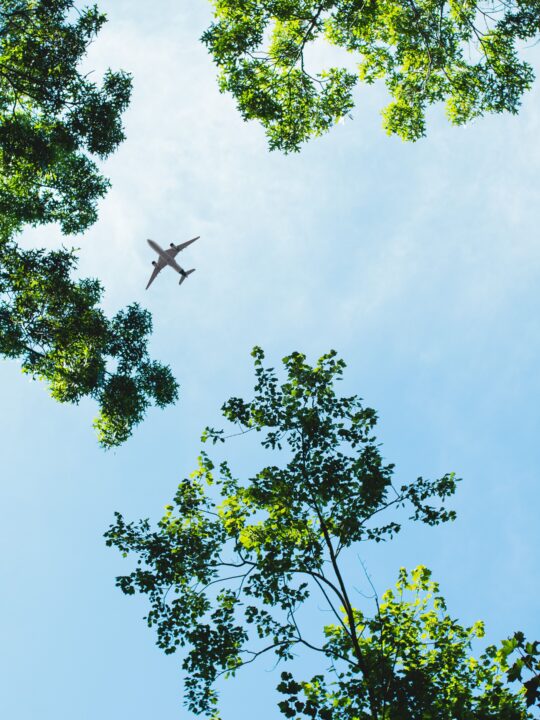The rise of eco travel could strengthen your brand

We’ve all been there. It’s day five of sad British drizzle. You look out the grey window and feel the urge to book a flight. But in 2023, a little voice in your head protests “but what about your carbon footprint?”
Travel is getting more controversial. From the uproar at celebrities overusing their private jets to the public debate on how soon tourists should return to Hawaii after the recent catastrophic wildfires — it’s an increasingly prominent conversation.
Airlines and travel agents are finally feeling the pressure to go green – but what if they saw consumers’ higher standards of sustainability as an opportunity, instead of a threat? The most successful brands are nearly always those which keep pace with the shifting priorities of their audience, and this is no different.
Let’s take a look at how mainstream travel brands can (and already do) harness the power of virtuous consumerism.
Do virtuous consumers still want to go on holiday?
The short answer is yes. Most of us are (at least a little) worried about the planet. But how does this manifest in spending behaviour?
Well, there were 45.6 million holidays abroad made by Brits in 2022, which is down from the peak in 2019, largely due to the cost of living crisis. More encouragingly, the global ecotourism industry is expected to have a compound annual growth rate of 15.2% until 2028 – so there’s clearly an escalating appetite for responsible travel.
Could this be because over 80% of young people are ‘eager to take action to help the environment’? Millennials, Gen Zs and younger generations are already more mindful of how their shopping, eating and holiday habits impact the environment – and this presents travel brands with an opportunity to step up their sustainability efforts to capture this market.
Take inspiration from brands leading the charge.
Granted, there are some specialist travel companies that have built their entire brand and offering around sustainability, but that’s not a pragmatic approach for every business. Increasingly, travel brands are offering transparency where they can’t offer a greener alternative — for instance, Skyscanner pulls forward the flight options which emit the least CO₂, giving consumers the chance to make an informed choice.
Similarly, G Adventures marks all their group trips with a Ripple score – a rating that indicates the proportion of funds raised by the trip funnelled back into the local community. They also founded the Trees for Days reforestation initiative, which plants a tree for every day a customer is away on their trip.
Even the industry giants are making high-profile moves to boost their profiles as a sustainable option: both Etihad and Virgin Atlantic have pledged to reach net zero carbon emissions by 2050. Virgin Voyages is also incorporating new green technology on its cruise ships, with a Swedish heat power system named Climeon. These units transform waste heat from engine cooling water to generate electricity – an innovative way to reduce consumption of power from the engines.
Transparency empowers your audience to go green.
Gone are the days when companies could stay silent about their efforts to run more sustainably. Now’s the time for brands to give their audiences transparency about the environmental impact of their products and services.
But transparency has to be handled with care. If we’ve learnt anything from the H&M greenwashing scandal, it’s that exaggerating environmental efforts is a bad idea. To appeal to the virtuous consumer, the information offered by businesses should be both true and backable. Equally, it’s not enough for brands to simply acknowledge their carbon emissions without also sharing the steps being taken to combat them, or improve sustainability in other ways.
Establishing a goal for carbon offsetting is one of the most common approaches, but there’s a multitude of options for travel brands to explore. Using more recycled materials, powering offices on renewable energy, incorporating electric or hybrid vehicles — these are all valuable steps bound to attract the virtuous consumer.
What does the future look like?
After a rocky decade of Brexit complications, Covid-19 travel restrictions and extreme weather events, the travel industry is already well-practised in adapting to changing consumer demand. Brands who closely observe the say-do gap, do their research on evolving sustainability standards, and respond with action will come out on top.
Ultimately, the travel industry has an opportunity to harness the potential of eco travel, carving out a future where their audience feels empowered to make greener choices without sacrificing the holidays they cherish. And this can only be done with a thorough understanding of behavioural patterns amongst your audience.
For more information on how you can finetune your approach with unique behavioural insight, contact Trinity McQueen today.

Nudging modern attention: How streaming platforms can make remembering easier

A new appetite: How FMCG brands can innovate for the GLP-1 consumer

Tapping into “cosy season” with simple seasonal wins for retailers.


 Back to articles
Back to articles